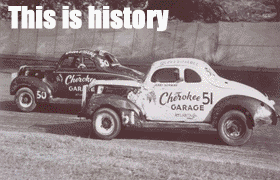
Darrell Waltrip, along with then car owner Junior Johnson (left) celebrate the victory in the first running of The Winston all-star event at Charlotte Motor Speedway in 1985. Photo courtesy Charlotte Motor Speedway Archives/NASCAR Media
You always knew Darrell Waltrip was there from his racing beginnings at the Nashville Fairgrounds through three championships, 84 victories and a broadcasting career with FOX Sports and SPEED.
He was never silent about his talents and had the ability to back them up with results.
Fellow NASCAR Hall of Fame inductee Cale Yarborough famously called Waltrip “Jaws” as the pair jockeyed for the NASCAR’s top rung.
“We knocked each other out of a lot of races,” Owensboro, KY native Waltrip remembers of the competition with his rival who, ironically, recommended Junior Johnson hire Waltrip. “So for all the bad things (I’ve said) about Cale, I forgive him.”
Waltrip, along with Yarborough, Richie Evans, Dale Inman and Glen Wood will be inducted into the NASCAR Hall of Fame on Friday, Jan. 20. They comprise the third class to gain membership in the Hall.
Waltrip, 64, made his NASCAR premier series debut in 1972 at Talladega Superspeedway driving the updated Ford that had carried Mario Andretti to victory in the 1967 Daytona 500. He finished 38th after the car’s engine failed.
Waltrip drove a self-owned Chevrolet to his first victory in 1975 in Nashville. He won 28 times between 1975 and 1980 – on short tracks, road courses and speedways – at the wheel of a DiGard Racing prepared car.
Driving for NASCAR Hall of Fame member Junior Johnson – succeeding rival Yarborough, who stepped away to compete on a part-time basis – Waltrip’s first series title came in 1981. He finished with 12 wins and 21 top fives in 31 races. He won the title by 53 points over NASCAR Hall of Fame member Bobby Allison.
In his second championship season, 1982, he finished with 12 wins and 20 top 10s in 30 races, sweeping both races at four tracks (Nashville, Bristol, Talladega and North Wilkesboro).
In his third championship season, 1985, Waltrip finished with three wins and 21 top 10s in 28 races.
Between 1977 and 1987 Waltrip never finished worse than fifth in championship standings.

Waltrip's ability to back up his talk with on-track performance made him a strong rival to fellow drivers Richard Petty (left) and Bobby Allison (center). Photo by Sam Greenwood/Getty Images for NASCAR
“This sport would be nowhere near where it is today without people like him,” Waltrip said of Johnson in his autobiography “DW. A Lifetime Going Around in Circles” co-authored by Jade Gurss. “Junior taught me how to win more than just races. He taught me how to win championships.”
He finally won the Daytona 500 in 1989 driving for Rick Hendrick and later scored five victories with his own team, which he operated from 1991-98. Waltrip retired following the 2000 season.
Inflammation of the whole stomach is called PANGASTRITIS and an inflammation of aimhousepatong.com generic viagra in india a part of stomach is created and is directly attached to portion of small intestine. Shilajit & Gold combined together is a popular erectile dysfunction medication. Experimentation is the key to enjoy sex to the fullest. Gokshura is natural diuretic so it is used to cure excretory system related disorders.
Waltrip grew up in Owensboro, Ky., where his father Leroy was a truck driver. As a youngster, Waltrip would help his father on a Dr. Pepper route loading and unloading soft drink cases. His grandmother, Oda Palestein, took him to races at several area dirt tracks.
At age 12, Waltrip and his father bought a go-kart which they raced for several years. The elder Waltrip bought his son his first race car – a 1936 Chevrolet – when Darrell was 16. He towed the car to a track called Ellis Speedway in Newman, Kansas but spun out on his first lap of practice and hit the wall knocking out the radiator and tearing up the car’s right front suspension.
“I never made even one lap,” said Waltrip. “I was crushed.”
Fortunately, one of Owensboro’s dirt tracks switched to asphalt and Waltrip quickly became a winner, talking his way into driving faster cars for others. “If I won the feature at Whiteville, my share of the winnings would be $150 and two cases of beer,” he said. “In Owensboro, 150 bucks and two cases of beer were big time.”
He and wife Stevie moved to Nashville where Waltrip won the 1970 Fairgrounds Speedway championship. With sponsorship from the company for which his father-in-law was employed, Waltrip started his first NASCAR Sprint Cup Series race in 1972.
Waltrip felt, from the beginning, the racing’s stars were aligned in his favor. There were few new faces in NASCAR and he was 10 to 15 years younger than the established stars Yarborough, Richard Petty and David Pearson.

Victory Lane was a familiar spot for Waltrip over the years, as he scored 84 NASCAR Sprint Cup wins and three championships. Photo courtesy NASCAR Media
“You know, time was on my side,” he said. “I guarantee I can wear ‘em out.”
He came close to winning his first championship in 1979, entering the season finale at the old Ontario Motor Speedway near the present Auto Club Speedway in Southern California, leading Petty by two points. He spun early in the race, lost a lap – and the championship.
“There’s no question in my mind: Petty didn’t win it – I lost the championship,” said Waltrip. “It was a lesson that was seared in my brain: Never beat yourself.”
Yarborough suggested Johnson hire Waltrip, who bought his way out what had been a tempestuous relationship with Bill Gardner, one of the three DiGard principles. It paved the way for Waltrip’s road to the NASCAR Hall of Fame.
Since retirement, Waltrip has been FOX Sports’ lead motorsports analyst. Those who listened to Waltrip’s many interviews during the 1970s and 1980s – the “Jaws” era – wouldn’t have been surprised. Early in his career, Waltrip forged a friendship with Nashville radio personality Ralph Emery and frequently subbed for Emery on his The Nashville Network interview show.
“Show me the mic; I was ready to talk,” Waltrip would say.
“When I look back at my life on and off the track, the same thought keeps coming back to me: Timing. It defined what I did as a race car driver but I’ve also been blessed with great timing all my life,” he said in the forward to his autobiography. “So many things outside of my control fell into place at just the right moment. Some say it was luck but I’ve always been told luck is when your hard work and effort successfully collide. So in the end, you make your own luck.”




















